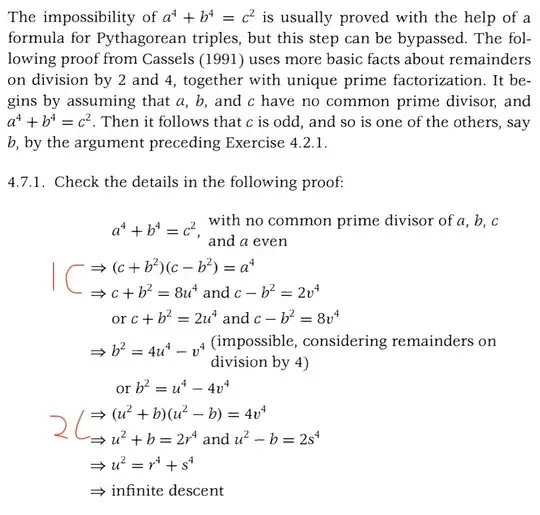Let's spell out some of the reasoning. If $a, b, c$ have no common divisor, then $c$ is odd. Why? Well, clearly, they can't all be even, because then they would have a common factor of $2$. But why can't $a$ and $b$ both be odd and $c$ even? Because the fourth power of an odd number is always equivalent to $1$ modulo $8$; their sum would then be equivalent to $2$ modulo $8$, and that can never be the square of an even number (which is always divisible by $4$).
Since $c$ is odd, $a$ and $b$ are one odd, one even. Say, without loss of generality, that $a$ is even and $b$ is odd. Then if $a = 2k$ for some integer $k$, then $a^4 = 16k^4$. So then the claim is that we can factor $c^2-b^4$ into $(c+b^2)(c-b^2)$, and one of them must be twice a fourth power and the other must be $8$ times a fourth power. Why?
Why couldn't they both be $4$ times a fourth power? Because $b$ is odd, and $(c+b^2)-(c-b^2) = 2b^2$. Twice an odd square is always equivalent to $2$ modulo $4$, meaning that $c+b^2$ and $c-b^2$ can't both be divisible by $4$.
Why couldn't one be $16$ times a fourth power and the other be any fourth power? Because the former would clearly be equal to $0$ modulo $8$, and the latter would also be equal to $0$ modulo $8$ (being even), and again their difference could not be twice an odd square.
Notice that $c+b^2$ and $c-b^2$ also cannot have any other common factors other than $2$. Why? Because then their sum $2c$ and their difference $2b^2$ would also have that common factor, which means that $c$ and $b$ would have a common factor, which they don't, by hypothesis.
A similar line of reasoning applies to $u^4-b^2 = (u^2+b)(u^2-b)$. The argument is that both factors must be $2$ times a fourth power. Why couldn't one be $4$ times a fourth power and the other any fourth power? If the latter is odd, then their difference is odd; if the latter is even, then their difference is divisible by $4$. Neither can be twice an odd number ($2b$).
Finally, $u$ is odd because $u^4 = b^2+4v^4$, and $b$ is odd. But $u$ and $b$ cannot have any common factors, because then $c = u^4-b^2$ would also have that factor in common with $b$, which again, they don't, by hypothesis.
